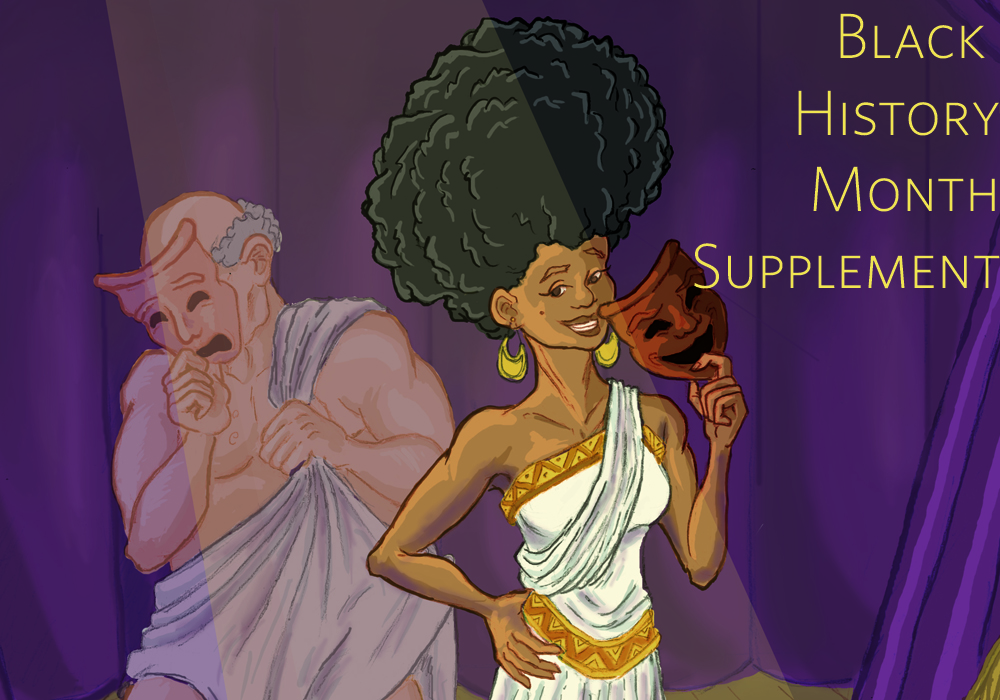Bernice Afriyie, Supplement Coordinator
You’ve probably heard the saying “black don’t crack.” Black is supposed to be seamless and smooth, but when we scrutinize this cultural myth, we see the cracks, dirt, and holes in something meant to be fluid. Black is stagnant. Each of the following members of the York community attempt to stir and probe new life into the word “black.” Bringing new ways of looking at the term and washing away the social and racist filth that sits undisturbed on the surface of our bodies, hearts, and minds.
Excalibur: What does Black History Month mean to you?
Nathan: To me it means helping our race because of what we went through, the struggles we went through, and the tribulations.
Excalibur: What does being black mean to you?
Nathan: Being black means standing up for something I believe in. Something I am, something I can’t change. Something I don’t want to change. Something that other people may look down at me for, but I look up for it.
– Nathan H
Excalibur: What does Black History Month mean to you?
Tahirah: I guess it just means the representation of what black people have gone through over the years and just celebrating that.
Excalibur: What does black identity mean to you?
Tahirah: I don’t know. I think it’s something that I’m still trying to figure out. It’s hard for me because I’m biracial. I’m not really sure.
Excalibur: Do you want to speak to some of the difficulties you’ve faced as a biracial woman?
Tahirah: Well my grandmother is white. People believe that one of my parents are full white but it’s just my grandmother. I guess with black people they tend to look down on me just because I may not relate to them fully. They think that I don’t understand what they go through in society and I guess that could be true. White people and other races are more accepting of me because of my skin tone and I guess because of that it’s like I’m kind of in the middle, but it hasn’t affected me as much as people might think it has.
–Tahirah Reynolds
Excalibur: What does Black History Month mean to you?
Robyn: Honestly, to me, I feel like we shouldn’t have Black History Month. I feel like we should celebrate black history all throughout the year. We shouldn’t just have one month dedicated to it and then forget about it for the rest of the year
Excalibur: What does black identity mean to you?
I don’t like being identified as just black. I don’t like being just put in one category. I like to identify as Jamaican, that’s what I am, but I feel like that’s a way for all of the black communities around the world to unite because we need that unity.
– Robyn Osborn
Samantha Lloyd and Rochelle Whylie (BHM- left and right respectively)
Excalibur: What does Black History Month mean to you?
Samantha: It’s weird that it has changed over the years, because when we were younger it was more prevalent and more important. Now, it’s like sometimes we forget because there isn’t that importance to it. So a lot of times even as black people we say “oh yeah it is our month,” but it should be all year round, really.
Rochelle: I was saying the same thing. I feel like Black History Month limits black history to a month, when black history is our history, right? The premise of capitalistic society started on the backs of slaves, so if you want to talk about black history you have to talk about American history and Canadian history. It’s a national history.
Samantha: Over here, we focus more on the American side of history. They forget about black Canadians or African Canadians over here and the history that started in Canada, the people who came over here and built lives, families, and generations. We’re in an African Canadian history class right now so luckily we’re getting more informed; it’s stuff that we didn’t even know about our own people, you know? Like our teacher said, that class shouldn’t even be a class. It should just be part of the regular
curriculum
Excalibur: What does being black mean to you?
Rochelle: That’s a big one.
Samantha: Yeah, that’s a big one. I’m not sure how to answer that.
Rochelle: Well, being black to me, that’s a notion, a created notion from this society. What does being black mean? There are many black cultures and many countries within Africa. There’s the African diaspora, like myself. There’s the Jamaican diaspora, the Trinidadian diaspora, the Caribbean diaspora, Brazilian diaspora – so what does being black mean? I’m black. She’s black. But we’re two different identities, two different cultures, and two different religions. What does that mean? Black can’t be a category. That puts me in a box where I am black, therefore I am this.
– Samantha Lloyd and Rochelle Whylie (left and right respectively)
Excalibur: What does Black History Month mean to you?
Kevin: Black History Month to me is a short pathetic attempt at creating some semblance of diversity and acceptance. It’s a teaspoon in an ocean.
Excalibur: What does black identity mean to you?
Kevin: Well black identity in this country is difficult. I mean, I’m Canadian-born, but I feel a sense of separation, somewhat in the fact that I have to, in some sense, maintain a role or try to feel like I fit in, or that a sense of who I am is based on seeking identity. That may not sound like it makes sense, but the black identity in this country is more about trying to prove that you are in fact Canadian, as opposed to just being who you are.
– Kevin DaCosta
Excalibur: What does Black History Month mean to you?
Xavier: It’s a month to remember when black people got the opportunity for freedom. Basically, it’s a celebration for black people. I don’t know how to word it, but just as someone celebrates their date of birth or celebrates Christmas, I feel like it’s the same thing as black people celebrating their time of freedom, their birth.
Excalibur: Is Black History Month still relevant today? Are black people now facing the same struggles as black people a hundred years ago?
Xavier: Black people don’t face the same struggles. It’s somewhat similar, but it’s branded in a way that we can’t really see it through media. It’s worded differently, but racism still occurs.
Excalibur: What does being black mean to you? What does being a black male mean?
Xavier: I feel like being a black male is one of the most powerful things, in my opinion, only because we face a lot of things that people don’t know. Even a black female wouldn’t know what a black male goes through. Not only being judged, but also the fact that when you walk into certain stores, employees, owners, and business managers will look at a black person differently from how they’d look at a white person. It’s a good feeling to be a black person and you walk into somewhere and someone underestimates you and thinks you can’t do something or you can’t purchase something and you do. But then it hurts when people think that oh, the only reason why you could purchase it is because you got it in an illegitimate way. But still, being a black male is still powerful.
Excalibur: What does Black History Month mean to you?
Paul: Black History Month means a lot of things. Primarily, it means recognizing contributions of Africans worldwide: African Canadians, African Americans, Africans from Africa and what they’ve done. The history that we see is often Eurocentric history. It’s told from a white perspective, so it’s good to see the contributions of Africans worldwide and acknowledge and recognize that in a formal way, because it isn’t recognized in the curriculum, in history, or in universities.
Excalibur: How can school curriculums change to reflect black contributions?
Paul: Curriculums can change by understanding that all civilizations have contributed to our world history. Reflect that by identifying historians, scientists, or mathematicians from all cultures who have contributed to the development of history, science, math, and culture. Students often don’t see those voices. They don’t believe black people have done anything outside of sports.
Excalibur: What does black identity mean to you?
Paul: Black identity is multidimensional. It’s a multiple representation in terms of who we are, recognizing the reality of who we are in terms of gender, racial and ethnic identity, and our situation in relation to our political, socioeconomic, and moral conditions, as well as our religious and ethical values.
Excalibur: Is there such a thing as a uniform black identity?
Paul: Not particularly. As black people come from different parts of the world there’s no such thing as a uniform identity. There’s unity in recognizing diversity, which is not just geographic in origin, but racial and sexual and so on.
– Paul Junor


